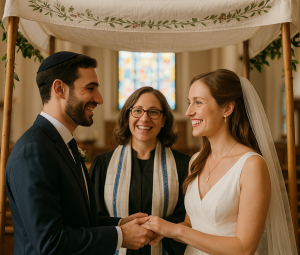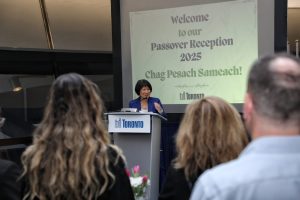 Patrick Desbois is in a race against time. The 55-year-old French Roman Catholic priest is president of Yahad In Unum, a Paris-based organization dedicated to finding the mass graves of Jews killed in eastern Europe during the Holocaust.
Patrick Desbois is in a race against time. The 55-year-old French Roman Catholic priest is president of Yahad In Unum, a Paris-based organization dedicated to finding the mass graves of Jews killed in eastern Europe during the Holocaust.
Patrick Desbois
Desbois relies on local witnesses to identify the sites of heretofore undiscovered mass executions in Ukraine, Russia, Belarus and Poland, where millions of Jews were murdered in a savage and systemized campaign of genocide.
Without their assistance, it would be next to impossible to locate and identify these sites, he said in an interview from his office in Paris last week.
Since many of the remaining witnesses are reaching the end of their lives, Desbois has no time to waste.
“We won’t know where the graves are unless we speak to the witnesses,” he said.
The grandson of a French deportee to a Nazi prisoner of war camp in Ukraine, Desbois will speak about his experiences when he visits Canada early in October.
His appearances in Toronto on Oct. 4 will be at the University of Toronto’s His appearances in Toronto on Oct. 4 will be at the University of Toronto’s Sidney Smith Hall at noon and at Beth Tzedec Congregation at 7:30 p.m. at noon and at Beth Tzedec Congregation at 7:30 p.m.
On Oct.5, in Montreal, Desbois is scheduled to address the Azrieli Foundation at the Centre Mont-Royal at 7:30 p.m.
Ordained as a priest in 1986, he co-founded Yahad In Unum in 2004, five years after being appointed secretary of the episcopal committee of the French Bishops for Relations with Judaism.
His co-founders were leaders of the Catholic and Jewish communities in France.
In addition to improving relations between Catholics and Jews, Yahad In Unum’s goal is to find the mass graves of Jews murdered by Nazi mobile killing units, known as Einsatzgruppen, in Ukraine, Russia, Belarus and Poland.
Yahad In Unum’s work is sanctioned by the Vatican.
By all accounts, 1.2 million Jews were killed in what was then the Soviet Union. A further three million Jews were slain in Poland.
Desbois’ interest in the Holocaust was piqued by his grandfather, Claudius, a soldier in the French army who was deported to a Nazi prison camp in Ukraine, Rawa-Ruska, in July 1942.
“He always told me it was awful,” Desbois said. “But he refused to speak about it.”
Propelled by curiosity and a desire to pay his respects to its victims, mainly Soviet soldiers captured in battles with the advancing German army after its invasion of the Soviet Union in 1941, Desbois visited the camp, which is 150 kilometres from the city of Lwow.
During his travels in Ukraine, he was dismayed to learn that the graves of the Jewish victims of the Holocaust were generally not marked.
In the past six years, Desbois and his associates have found about 600 extermination sites, containing a still undetermined number of corpses.
Their work is funded by the German government and a host of private foundations.
On average, Yahad In Unum sends an investigative team to eastern Europe once a month. Before a team is dispatched, Yahad In Unum researchers review war archives in the former Soviet Union and Germany and at the Holocaust Memorial Museum in Washington, D.C.
With this information in hand, Yahad In Unum personnel visit villages and interview residents who witnessed Nazi atrocities.
In his quest to document the Holocaust in these countries, Desbois has repeatedly travelled to the former Soviet Union and Poland.
“A war does not end until all the dead are buried,” Desbois has said in explaining the importance of his work.
Desbois, who has studied the Holocaust at Yad Vashem in Jerusalem, was a personal aide to the late archbishop of Paris, Cardinal Jean-Marie Lustiger, a Polish-born Jew who converted to Christianity.
A consultant to the Vatican on relations with Jews, Desbois is the author of The Holocaust by Bullets. Published by Palgrave MacMillan in 2008, it was the winner of the National Jewish Book Award.
Desbois, who speaks Hebrew fluently, has been showered with an array of awards – the Medal of Valor from the Simon Wiesenthal Center, honorary doctorate degrees from the Hebrew University and Bar-Ilan University and the Humanitarian Award from the United States Holocaust Memorial Museum.






